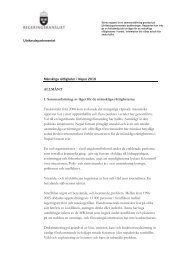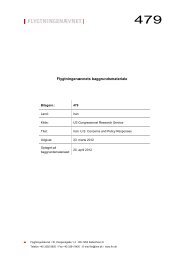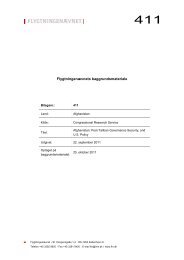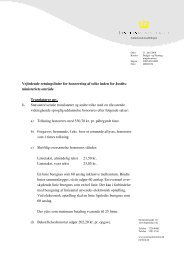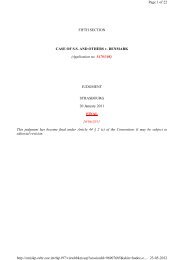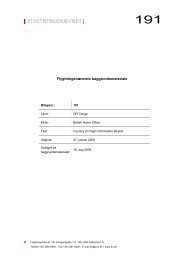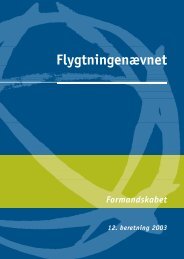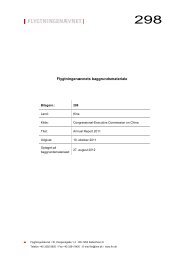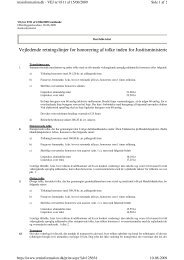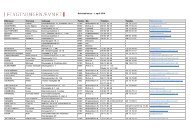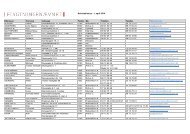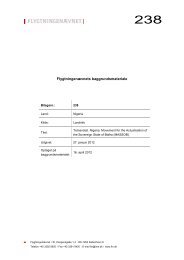Annual Report - National Human Rights Commission
Annual Report - National Human Rights Commission
Annual Report - National Human Rights Commission
You also want an ePaper? Increase the reach of your titles
YUMPU automatically turns print PDFs into web optimized ePapers that Google loves.
Annexure 12<br />
○ ○ ○ ○ ○ ○ ○ ○ ○ ○ ○ ○ ○ ○ ○ ○ ○ ○ ○ ○ ○ ○ ○ ○ ○ ○ ○ ○ ○ ○ ○ ○ ○ ○ ○ ○ ○ ○ ○ ○ ○ ○ ○ ○ ○ ○ ○ ○ ○ ○ ○ ○ ○ ○ ○ ○ ○ ○ ○ ○ ○ ○<br />
○<br />
Organized Crime Approach<br />
This study has shown that trafficking involves a multiplicity of well-organized exploiters. The<br />
manifestations of trafficking present all parameters required for an organized crime. It is a chain<br />
of offences, involving multiple abuses and violations, and a host of offenders at various levels.<br />
Data also provides adequate instances of this organized crime being trans-national. Therefore,<br />
special provisions of law should be brought in, wherever appropriate, to deal with these organized<br />
criminals. The law enforcement officials should consider invoking the provisions of the special<br />
legislations on organized crimes, wherever applicable. Many state governments have already<br />
enacted special laws on organized crimes. Trafficking offences should be brought under the<br />
ambit of such special laws.<br />
<strong>National</strong> Database and Data Surveillance<br />
The research shows that there is a need for effective monitoring of the data on cases of trafficking.<br />
The supervisory officers should carry out regular and in-depth study of the data, understand the<br />
trends and take appropriate steps to ensure that victims are not arrested or harassed and that their<br />
rights are fully protected. Guidelines for monitoring the trafficking cases should be developed. It<br />
should include collation of data of the review period separately under different sections of ITPA<br />
(Sections 3 to 9), related sections of IPC and Local Acts, as well as the preventive sections of<br />
Cr.PC. The data should provide the details of cases registered, chargesheeted and convicted.<br />
The details of arrest and conviction should be separately indicated for males and females as well<br />
as for adults and children. The data should also show the number of rescued persons (with sex<br />
and age disaggregation) and the details of persons repatriated/rehabilitated. Data surveillance<br />
with such details will expose the violation of rights that take place in law enforcement and,<br />
therefore, will facilitate in reorienting law enforcement, keeping in mind the best interests of the<br />
victims. Similarly, the data being collected and published by the <strong>National</strong> Crime Records Bureau<br />
(in its annual publication Crime in India) should also reflect the data on trafficking in women<br />
and children, with sex and age disaggregation as above. It should also have details of arrests and<br />
convictions, specifically stated under the various sections of ITPA.<br />
<strong>National</strong> System of Intelligence Dissemination on Traffickers and<br />
Exploiters<br />
The research has exposed a serious vacuum in the law enforcement scenario in the absence of a<br />
national system of data collection and information on traffickers and other exploiters. Trafficking<br />
has emerged as a serious organized crime cutting across districts, states and nations. Hence,<br />
effective law enforcement essentially calls for sharing of intelligence and data by all concerned.<br />
The shackles of boundaries that tie down the law enforcement agencies are being effectively<br />
capitalised by the exploiters. The study has also shown that certain NGOs working in this field<br />
have large databases, which could be effectively tapped by the police. However, there is no<br />
national criminal intelligence organization which can collate the data, build up the database and<br />
disseminate it to all concerned. This has to be done by an appropriate law enforcement agency.<br />
Delhi High Court, acting on a public petition, had directed CBI to start a Cell on criminal records<br />
286<br />
<strong>National</strong> <strong>Human</strong> <strong>Rights</strong> <strong>Commission</strong> <strong>Annual</strong> <strong>Report</strong> - 2004-2005<br />
AR-Chapter-1-19-10-6-06.p65<br />
306<br />
7/17/06, 6:31 PM



